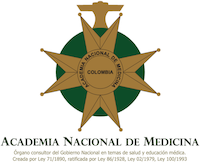Estado Nutricional del Yodo.
Palabras clave:
yodo, deficiencia, autoinmunidad, tiroides, yoduria, bocio, iodine, deficiency, autoimmunity, thyroid, urinary iodine, goiterResumen
IMPLICACIÓN EN LA POSITIVIDAD DE ANTICUERPOS ANTITIROIDEOS Y POSIBLE AUTOINMUNIDAD TIROIDEA EN UNA POBLACIÓN ESCOLAR DECLARADA "LIBRE DE DESÓRDENES POR DEFICIENCIA DE YODO". INTRODUCCIÓN: Los Desórdenes por Deficiencia de Yodo son un problema serio de salud pública, con cerca de 2 mil millones de personas a riesgo de padecerlos, pudiendo causar bocio neonatal, cretinismo, retardo mental, hipotiroidismo, entre otros. Estos desórdenes son aún prevalentes, y en algunos casos los esfuerzos para su erradicación se han traducido en aumento del riesgo de exceso poblacional de yodo y autoinmunidad tiroidea. En Colombia, se desconoce el estado real de yodo en la población. OBJETIVOS: Determinar la mediana de la yoduría en población escolar, y de los hábitos del consumo de sal, función y parámetros de autoinmunidad tiroidea, y cociente intelectual. MATERIALES Y MÉTODOS: Estudio basado en la comunidad, de corte transversal. Se evaluaron las variables sociodemográficas, la frecuencia de bocio y los niveles de TSH, anti-TPO, anti-Tg, anti-TSHR, yoduria, test de factor G de Cattell, y hábitos del consumo de sal. RESULTADOS: El consumo de sal promedio persona/día fue de 18,13 g. El 37,9% presentó bocio. 36,1% tenían un valor límite en el cociente intelectual. La mediana de yoduria fue de 510,3 μg/L. El 42,75% tuvo anti-TPO positivos, y el 2,87% anti-Tg positivos. El 10% presentó niveles de TSH elevados. CONCLUSIÓN: En escolares de zona urbana, hay un exceso en la mediana de yoduria, pudiendo explicarse por el alto consumo de sal. La alta prevalencia de autoinmunidad tiroidea y bocio, junto al alto nivel de la TSH, puede ser consecuencia del exceso en la ingesta de sal y de otros factores medioambientales/ hereditarios. IODINE NUTRITIONAL STATUS ITS ROLE IN DETECTION OF THYROID AUTOANTIBODIES AND POSSIBLY, THYROID AUTOIMMUNITY, IN A SCHOLAR POPULATION DECLARED “FREE FROM IODINE-DEFICIENCY DISORDERS” ABSTRACT INTRODUCTION: Iodine-Deficiency Disorders are a serious public health problem, with nearly two thousand million people at risk of suffering them; they may cause neonatal goiter, cretinism, mental retardation, hypothyroidism, among other conditions. These disorders are still prevalent, and in some cases, efforts for their erradication have resulted in increased risk of excess iodine and thyroid autoimmunity in the population. In Colombia, the actual iodine status of people is unknown. OBJECTIVES: To determine the median urinary iodine concentration in schoolchildren, salt intake habits, function and parameters of thyroid autoimmunity, and Intelligence Quotient (IQ). MATERIALS AND METHODS: This is a community-based, cross-sectional study. Sociodemographic variables were evaluated, as well as the frequency of goiter and levels of TSH, anti-TPO, anti-Tg, anti-TSH-R, urinary iodine, G factor test of Cattell and salt consumption habits. Results: The average salt consumption person/day was 18,13 g. 37,9% had goiter. 36,1% had a limited value in their IQ. The median urinary iodine was 510,3 μg/L. 42,75% had positive anti-TPO and 2,87% were anti-Tg positive. 10% had high levels of TSH. CONCLUSIONS: In urban area schoolchildren there is an excess in median urinary iodine, that can be explained by high consumption of salt. The high prevalence of goiter and thyroid autoimmunity, together with the high level of TSH, may result from excessive intake of salt and other environmental and hereditary factors.Biografía del autor/a
Hernando Vargas Uricoechea, Universidad del Cauca, Popayán
Beatriz Bastidas Sánchez, Universidad del Cauca, Popayán
Martha Perdomo Cabrera, Universidad del Cauca, Popayán
Hernando Vargas Sierra, Hospital Universitario san José, Popayán-Cauca
Referencias bibliográficas
Zimmerman MB, Boelaert K. Iodine deficiency and thyroid disorders. Lancet Diabetes Endocrinol 2015. Published Online January 13, 2015.http://dx.doi. org/10.1016/S2213-8587(14)70225-6.
Lazarus JH. The importance of iodine in public health. Environ Geochem Health. 2015.Feb 7. [Epub ahead of print] DOI 10.1007/s10653-015-9681-4.
Nyenwe EA, Dagogo-Jack S. Iodine Deficiency Disorders in the Iodine-Replete Environment. Am J Med Sci.2009;337(1):37-40.
Zimmermann MB, Andersson M. Assessment of iodine nutrition in populations: past, present, and future. Nutr Rev.2012;70:553-570.
Bath SC, Rayman MP. A review of the iodine status of UK pregnant women and its implications for the off- spring. Environ Geochem Health. 2015, Feb 7. [Epub ahead of print] DOI 10.1007/s10653-015-9682-3.
Masoodi SR, Ali A, Wani AI, Bashir MI, Bhat JA, Mudassar S, Zargar AH. Goitre and urinary iodine excretion survey in schoolchildren of Kashmir Valley. Clin Endocrinol.2014;80:141-147.
Chung HR. Iodine and thyroid function. Ann Pediatr Endocrinol Metab. 2014;19(1):8-12.
Zimmermann MB. Iodine deficiency and excess in children: worldwide status in 2013. Endocr Pract.2013;19(5):839-846.
Pearce EN, Andersson M, Zimmermann MB. Global iodine nutrition: Where do we stand in 2013? Thy- roid.2013;23(5):523-528.
WHO/UNICEF/ICCIDD. Assessment of iodine de- ficiency disorders and monitoring their elimination: a guide for programme managers [updated 1st September 2008]. 3rd edn. Geneva, Switzerland: World Health Organization, 2007.
Rohner F, Zimmermann M, Jooste P, Pandav C, Caldwell K, Raghavan R, Raiten DJ. Biomarkers of Nutrition for Development-Iodine Review. J Nutr.2014. pii:jn.113.181974.
Doggui R, El Atia J. Iodine deficiency: Physiological, clinical and epidemiological features, and pre-analyti- cal considerations. Ann Endocrinol (Paris). 2015, Jan 19. [Epub ahead of print] pii: S0003-4266(14)01011-7. doi: 10.1016/j.ando.2014.12.002.
Vargas-Uricoechea H, Sierra-Torres CH, Holguín- Betancourt CM, Cristancho-Torres L. Iodine-deficiency disorders. Permanent surveillance of vulnerable zones is poor. MEDICINA. (Bogotá).2012;34,No. 2(97):119-144.
Taylor PN, Okosieme OE, Dayan CM, Lazarus JH. Therapy of endocrine disease: impact of iodine supplementation in mild-to-moderate iodine defi- ciency: systematic review and meta-analysis. Eur J Endocrinol. 2014;170:R1-R15.
WHO. Guideline: fortification of food-grade salt with iodine for the prevention and control of iodine deficiency disorders. Geneva: World Health Orga- nization; 2014.
Aburto N, Abudou M, Candeias V, Wu T. Effect and safety of salt iodization to prevent iodine deficiency disorders: a systematic review with meta-analyses. WHO eLibrary of Evidence for Nutrition Actions (eLENA). Geneva: World Health Organization; 2014.
Zhou SJ, Anderson AJ, Gibson RA, Makrides M. Effect of iodine. supplementation in pregnancy on child development and other clinical outcomes: a systematic review of randomized controlled trials. Am J Clin Nutr.2013;98(5):1241-1254.
Zimmerman MB. Assessing Iodine Status and Monitoring Progress of Iodized Salt Programs. J Nutr.2004;134:1673-1677.
Vigilancia Epidemiológica de los Desórdenes por Deficiencia de Yodo. Colombia, 1.997 Ministerio de Salud/INS/UNICEF/ICBF/INVIMA/OPS/OMS. 1998.
Control de los Desórdenes por deficiencia de Yodo en Colombia. Evaluación Externa. Ministerio de Salud/OPS/OMS. 1998:3-8.
Ministerio de Salud, Instituto Nacional de Salud, Instituto Colombiano de Bienestar Familiar, Socie- dad Colombiana de Endocrinología, UNICEF-OPS/ OMS, Colciencias. Prevalencia de los Desórdenes por Deficiencia de Yodo e Ingestión Promedio de Sal. Colombia, 1994-1998. Santa Fe de Bogotá, D.C., primera edición; noviembre de 2001. ISBN 958-13-0129-1.
Gallego ML, Loango N, Londoño AL, Landázuri P. Niveles de excreción urinaria de yodo en escola- res del Quindío, 2006–2007. Rev. Salud Pública. 2009;11(6):952-960.
Programa de las Naciones Unidas para el Desarrollo (PNUD). Colombia - Universidad del Cauca, Marzo de 2012. ISBN 978-958-8758-13-8.
Ministerio de la Protección Social, Instituto Colom- biano de Bienestar Familiar, Instituto Nacional de Salud. Instructivo para la Implementación de los Patrones de Crecimiento de la OMS en Colombia para Niños, Niñas y Adolescentes de 0 a 18 Años. Primera edición. 2010, pags:1-151.
World Health Organization-WHO. International Council for Control of Iodine Deficiency Disorders. Assess- ment of iodine deficiency disorders and monitoring their elimination. A guide programmed managers, 2nd edition. Geneva, Switzerland, WHO, Department of Nutrition for Health and Development; 2001. (WHO/ NHD/01.1).
Matyjaszek-Matuszek B, Pyzik A, Nowakowski A, Ja- rosz MJ. Diagnostic methods of TSH in thyroid screen- ing tests. Ann Agric Environ Med. 2013;20(4):731-735.
IMMULITE/IMMULITE 1000 anti-TPO Ab (PILKTO-12, 2006-12-29).
Schott M, Seibler J, Scherbaum WA. Diagnostic testing for autoimmune thyroid diseases. J Lab Med.2006;34(4):254-257.
Zöphel K, von Landenberg P, Roggenbuck D, Wun- derlich G, Kotzerke J, Lackner KJ. Are porcine and human TSH receptor antibody measurements com- parable? Clin Lab. 2008;54(1-2):1-8.
Zimmerman MB, Jooste PL, Pandav CS. Iodine deficiency disorders. Lancet. 2008;372:1251-1262.
Cattell RB, Cattell AKS. Test de Factor G-Escala 1. Madrid: TEA; 1989.
Cattell RB, Cattell AKS. Test de Factor G-Escalas 2 y 3. Madrid: TEA;1994.
ICBF. PROFAMILIA. Encuesta Nacional de Demo- grafía y Salud. Encuesta Nacional de la Situación Nutricional 2005. Componente de Antropometría. Manual de Instrucciones y Equipos. Bogotá, 2004.
WHO Multicentre Growth Reference Study Group. WHO Child Growth Standard based on length/ height, weight, and age. Acta Paediatrica 2006; Suppl 450:76-85.
Zava T.T., Zava D.T. Assessment of Japanese iodine intake based on seaweed consumption in Japan: A literature-based analysis. Thyroid Res. 2011;4:14. doi: 10.1186/1756-6614-4-14.
Sarne D. Effects of the Environment, Chemicals and Drugs on Thyroid Function. In: De Groot LJ, Beck- Peccoz P, Chrousos G, Dungan K, Grossman A, Hershman JM, Koch C, McLachlan R, New M, Rebar R, Singer F, Vinik A, Weickert MO, editors. Endotext [Internet]. South Dartmouth (MA): MDText.com, Inc.; 2000-2010 Dec 21.
Wang L, Shao YY, Ballock RT. Thyroid hormone-me- diated growth and differentiation of growth plate chon- drocytes involves IGF-1 modulation of beta-catenin signaling. J Bone Miner Res. 2010;25(5):1138-1146.
Fiore E, Latrofa F, Vitti P. Iodine, thyroid autoimmunity and cancer. Eur Thyroid J. 2015;4(1):26-35.
Luo Y, Kawashima A, Ishido Y, Yoshihara A, Oda K, Hiroi N, Ito T, Ishii N, Suzuki K. Iodine excess as an environmental risk factor for autoimmune thyroid disease. Int J Mol Sci. 2014;15(7):12895-12912.
Vargas-Uricoechea H, Bonelo-Perdomo A, Sierra- Torres CH. Iodine Deficiency Disorders. Thyroid Disorders Ther.2015;4:172.
Kaloumenou I, Mastorakos G, Alevizaki M, Duntas LH, Mantzou E, Ladopoulos C, Antoniou A, Chiotis D, Papassotiriou I, Chrousos GP, Dacou-Voutetakis C. Thyroid autoimmunity in schoolchildren in an area with long-standing iodine sufficiency: correlation with gender, pubertal stage, and maternal thyroid autoim- munity. Thyroid. 2008;18(7):747-754.
Miranda DM, Massom JN, Catarino RM, Santos RT, Toyoda SS, Marone MM, Tomimori EK, Monte O. Impact of nutritional iodine optimization on rates of thyroid hypoechogenicity and autoimmune thyroid- itis: a cross-sectional, comparative study. Thyroid.
;25(1):118-124.
Gopalakrishnan S, Singh SP, Prasad WR, Jain SK, Ambardar VK, Sankar R. Prevalence of goitre and autoimmune thyroiditis in schoolchildren in Delhi, India, after two decades of salt iodisation. J Pediatr Endocrinol Metab. 2006;19(7):889-893.
Cómo citar
Descargas
Publicado
Número
Sección
Licencia
Copyright
ANM de Colombia
Los autores deben declarar revisión, validación y aprobación para publicación del manuscrito, además de la cesión de los derechos patrimoniales de publicación, mediante un documento que debe ser enviado antes de la aparición del escrito. Puede solicitar el formato a través del correo revistamedicina@anmdecolombia.org.co o descargarlo directamente Documento Garantías y cesión de derechos.docx
Copyright
ANM de Colombia
Authors must state that they reviewed, validated and approved the manuscript's publication. Moreover, they must sign a model release that should be sent.
| Estadísticas de artículo | |
|---|---|
| Vistas de resúmenes | |
| Vistas de PDF | |
| Descargas de PDF | |
| Vistas de HTML | |
| Otras vistas | |



